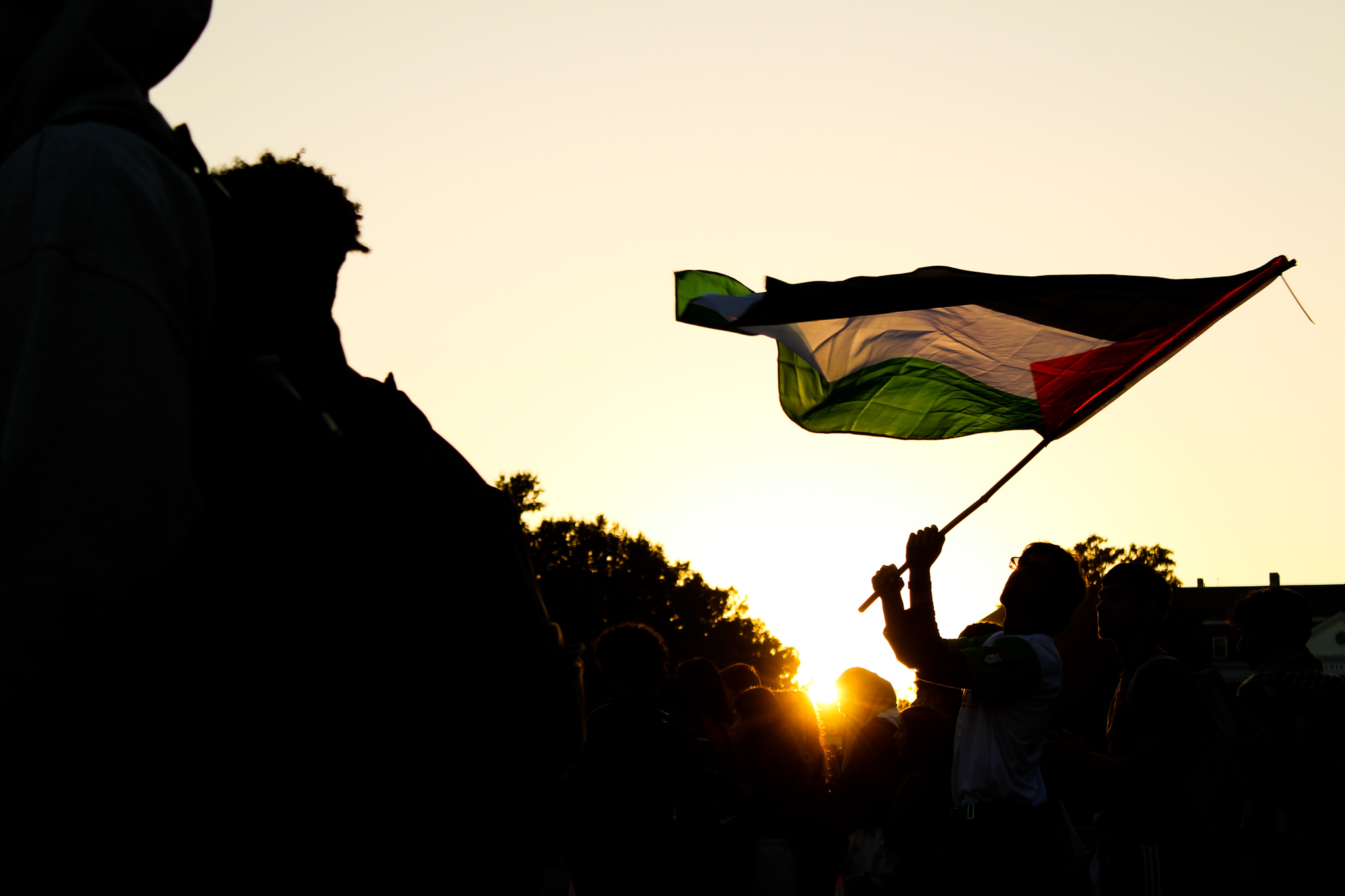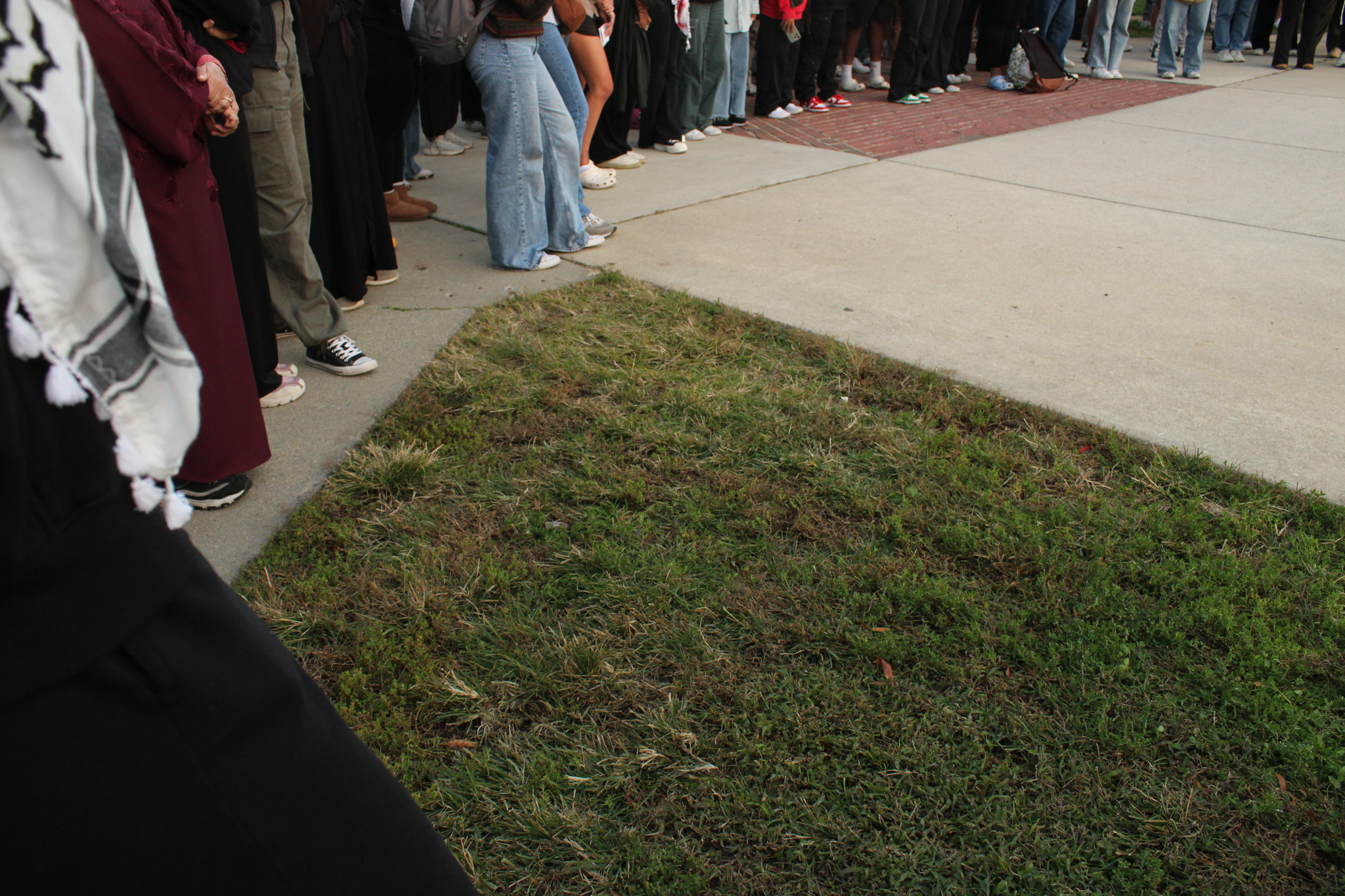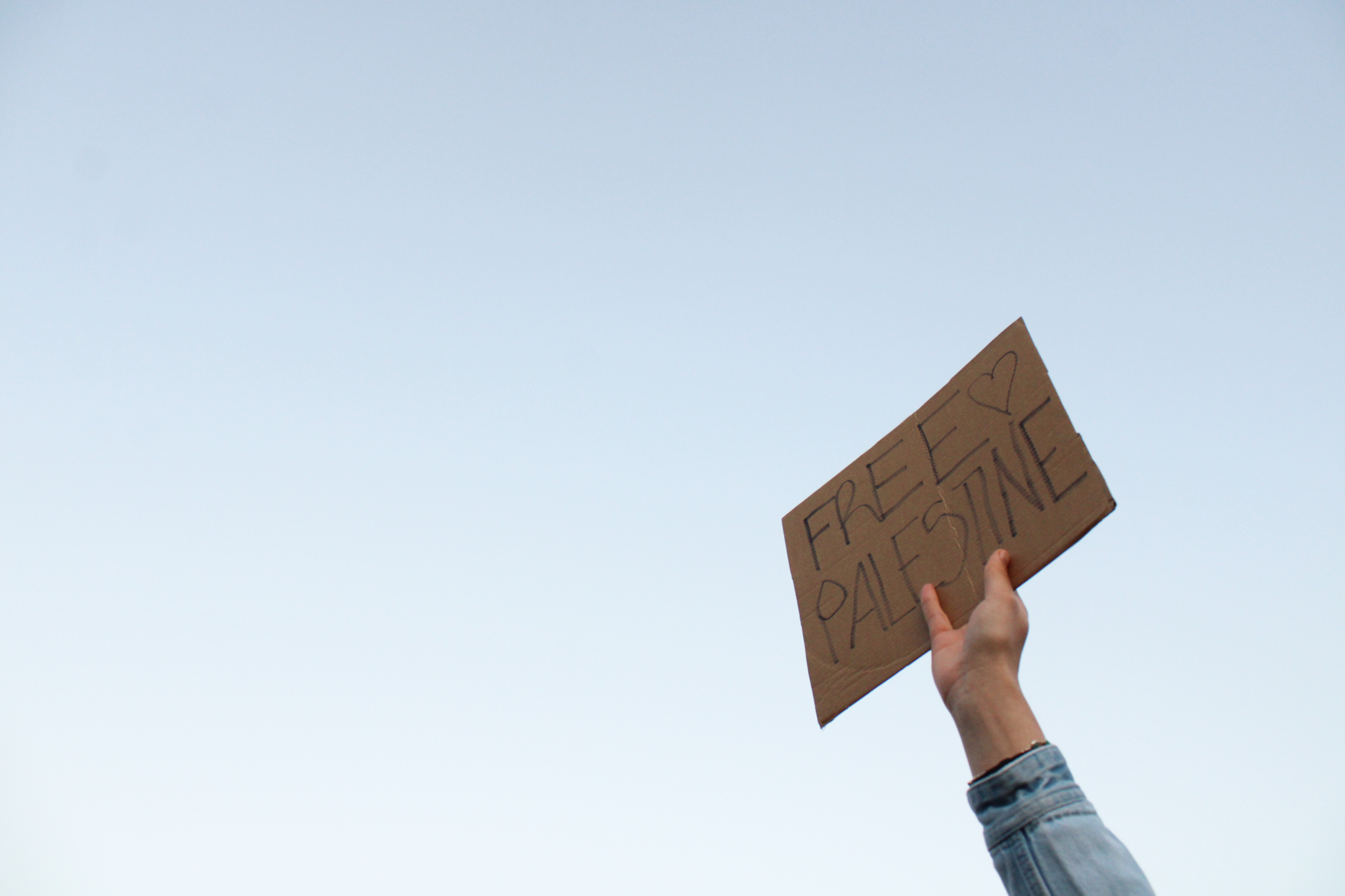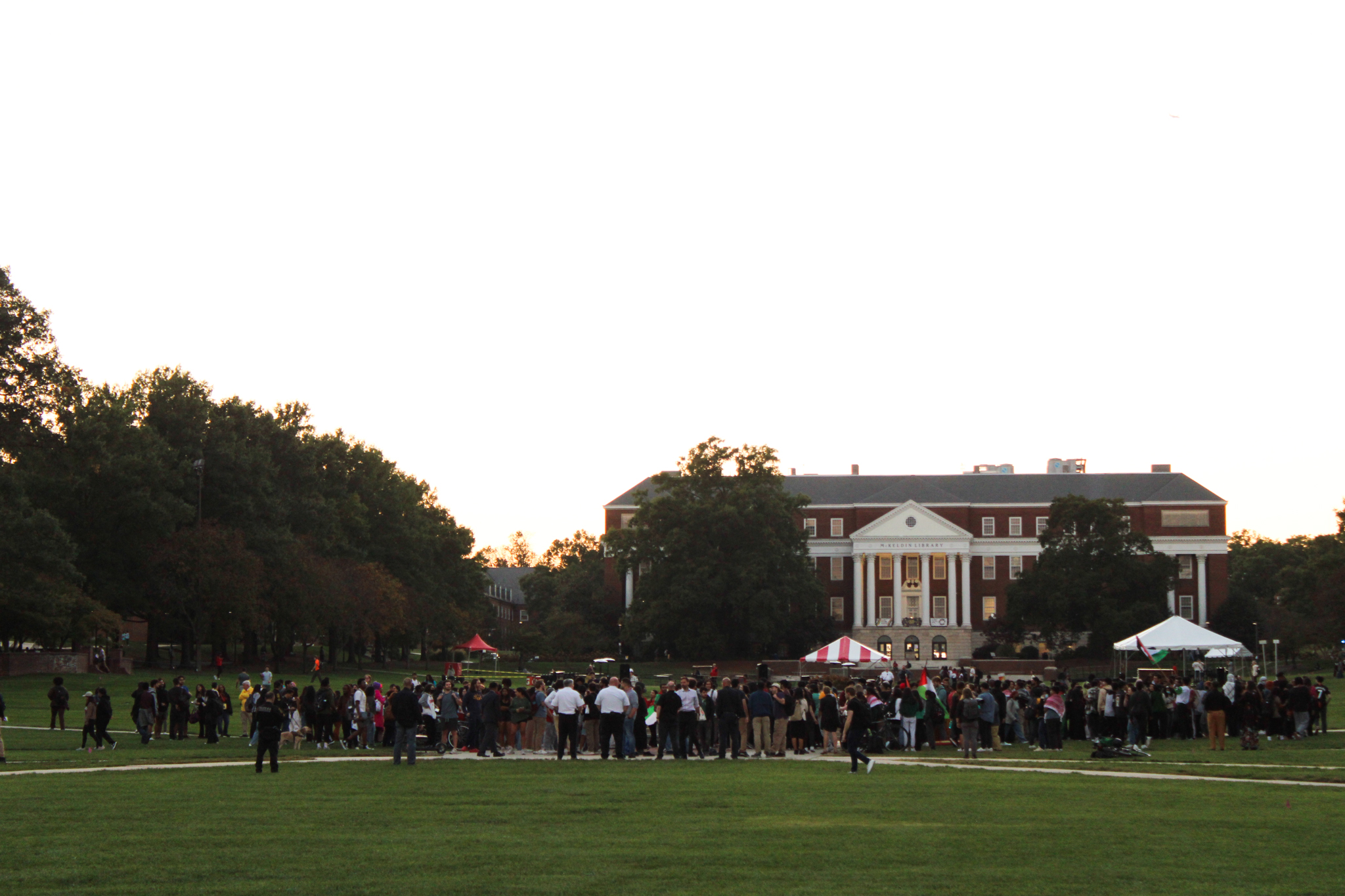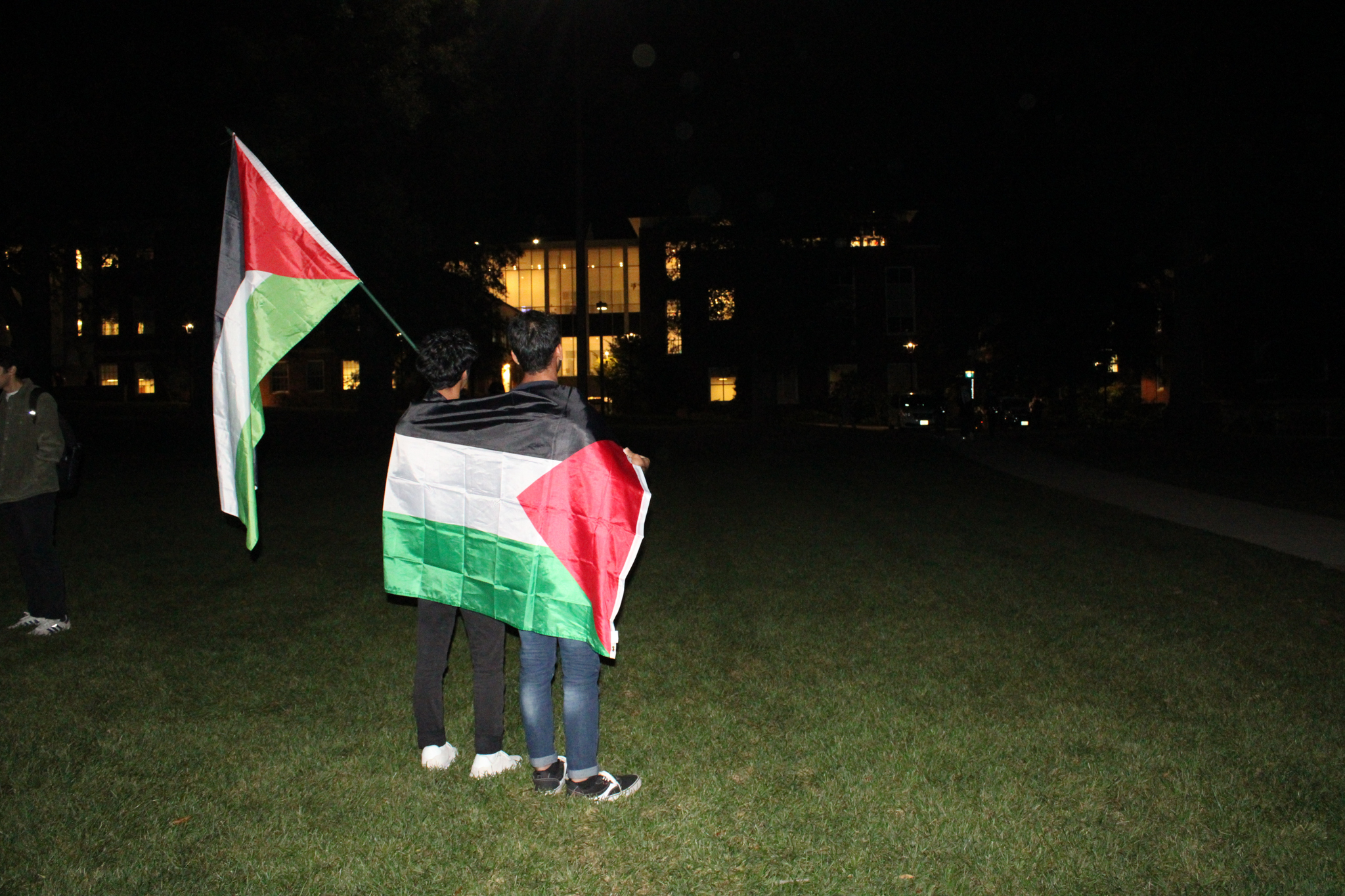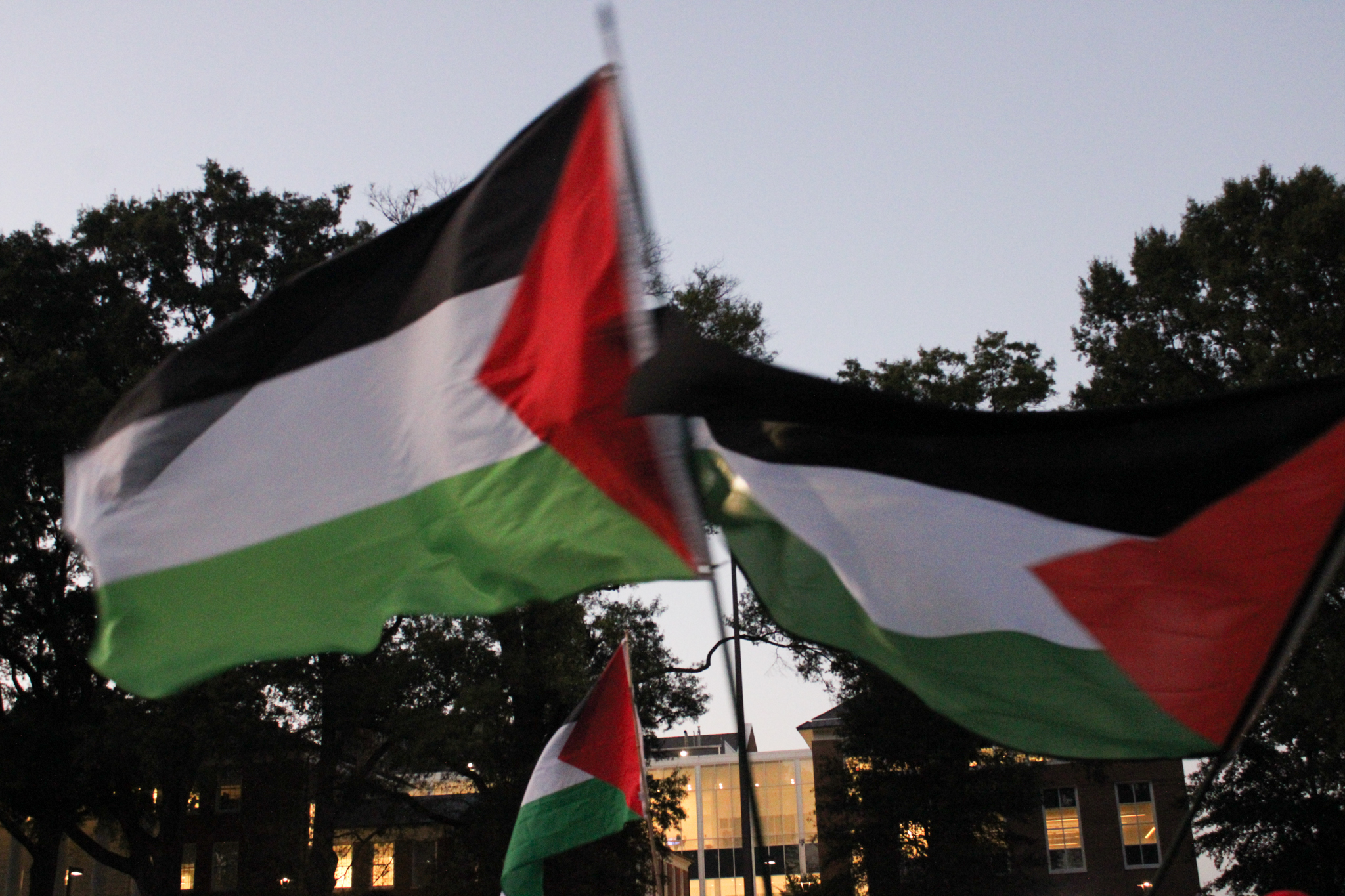As Palestinian flags waved, a crowd of about 200 people gathered on McKeldin Mall Thursday to educate community members and reflect on ongoing violence in Israel and Palestine.
The University of Maryland chapter of Students for Justice in Palestine hosted a vigil and teach-in where attendees expressed support for Palestine. During moments of silence that punctuated the evening, attendees mourned the lives lost in recent and historical events.
“The events that are happening in Gaza right now, in Palestine right now, shocked the world,” said a member of Students for Justice in Palestine, who wished to remain anonymous for fear of retaliation. “We have people of all kinds of backgrounds who are seeing the news and they’re shocked.”
Students for Justice in Palestine’s event came after a surge of violence in Israel and Palestine.
As of Thursday, more than 1,400 people in Gaza had been killed, according to the Gaza Health Ministry. More than 1,200 people in Israel had been killed as of Thursday, the Associated Press reported. As of Sunday, the death toll, most of which is civilians, rose to more than 2,600 people in Gaza, according to the Gaza Health Ministry, and more than 1,400 people in Israel, the Associated Press reported.
Hamas militants launched an attack from the blockaded Gaza Strip Oct. 7 that killed hundreds in nearby Israeli towns, the Associated Press reported. The next day, the Israeli government declared war against Hamas and has since launched numerous airstrikes on Gaza, the Associated Press reported.
The anonymous member of Students for Justice in Palestine said Thursday’s event was both a vigil and teach-in because Palestinian students’ mourning comes with a desire to educate others about the movement for justice in Palestine.
[About 1,000 UMD community members gather for vigil after attack in Israel]
In addition to mourning the lives lost, much of the event revolved around calls to “free Palestine” — a phrase that has long been at the center of calls for Palestinian liberation.
To this university’s chapter of Students for Justice in Palestine, the phrase includes educating others about the “plight of the Palestinian people,” the anonymous member of the organization said. The phrase also calls for Palestinian people to be free “from the state of occupation that they have been under for 75 years,” the anonymous member said.
“Any tears we shed, any remorse we feel, is intertwined with a desire for liberation, desire for justice,” the anonymous member said.
The calls stem from the permanent displacement of more than 750,000 Palestinians from 1947 to 1949 as part of the Nakba — “catastrophe” in Arabic — because of the Arab-Israeli War and the State of Israel’s establishment.
Attendees at the vigil and teach-in shared several connections to Palestine, saying both historical violence and recent events have impacted people they know.
Public policy graduate student Noor Tofailli, whose mom is Palestinian, said her grandparents “fled Palestine at the beginning of the Nakba.”
Tofailli, the graduate representative in this university’s Organization of Arab Students, added that she still has personal connections to the region.
“I do have friends in Gaza,” Tofailli told The Diamondback on Oct. 10. “[I] have not been able to hear anything from them because of the electricity collapse, so I don’t know if they’re alive or dead.”
[‘Every Child Matters’: UMD native, indigenous student group decries residential schools]
Leah Bregman, the president of this university’s Jewish Student Union, said in a Thursday interview with The Diamondback that although she did not agree with everything said at the event, she respects that community members held the vigil.
“It’s important to mourn the lives of the people that were lost,” Bregman, a senior marketing and management major said. “Lives keep getting lost, and it’s just a really unfortunate situation. I just don’t think anybody deserves that.”
The Associated Press reported last week that the Israeli government announced a “total” blockade of the Gaza Strip — cutting electricity and blocking food and fuel from the region’s 2-million-person population.
On Friday, the Associated Press reported that the Israeli military told 1.1 million people in northern Gaza to evacuate south within 24 hours amid a growing water and medical supply shortage.
Despite the recent tragedies, speakers at Thursday’s event highlighted Palestinians’ resilience in the face of adversity.
“Let this be our message to the world: you can take our water, you can take our food, you can take our electricity, and yet we will stand here today,” one speaker said at the event.
The event also drew several attendees who did not have personal connections to Israel or Palestine and wanted to learn.
“I’m really happy to see a lot of different people here from many different places,” said junior information science major Minna Hudhud. “That just makes me happy that the support isn’t just within the Arab or Muslim community. It’s more broad than that.”
Ronald Zeigler, the Nyumburu Cultural Center’s director, said in a speech at the event that members of this university’s community should respect Students for Justice in Palestine and emphasized the gathering was “an attempt to heal and work with each other.”
In a Thursday statement, this university told The Diamondback that it recognizes recent events “have had a devastating and wide-ranging impact for many in the University of Maryland community, including our students, faculty, staff, families and alumni.”
This university has also “worked with student groups and individual members who are grappling with tragedy,” the statement read.
Several students at the event Thursday were Muslim and said their faith prompted them to attend the vigil and teach-in.
“The Muslim community is one where there’s a strong, strong emphasis on community, irrespective of the racial characterizations that we have and cultural characterizations,” the anonymous member of Students for Justice in Palestine said. “You have this sense of a wider global community.”
Senior information science major Omar Omar, a Palestinian student and member of the Muslim Student Association, reflected on a previous trip to Gaza with mixed emotions. He said although the region was beautiful, it was sad to people there who were struggling.
Sophomore neuroscience major Yusra Umer, another member of the Muslim Student Association, said she does not have a personal connection to Palestine, but it was “heartbreaking” to hear from people who have been personally affected by the events in Palestine during the vigil.
“I have been brought to tears multiple times, even just standing here, I was wiping my eyes,” Umer said. “It’s such a strong emotion, just the anger and the frustration and the powerlessness not knowing what you can really do.”
Senior staff writers Marwa Barakat, Shifra Dayak, Marijke Friedman and Akshaj Gaur contributed to this story.
